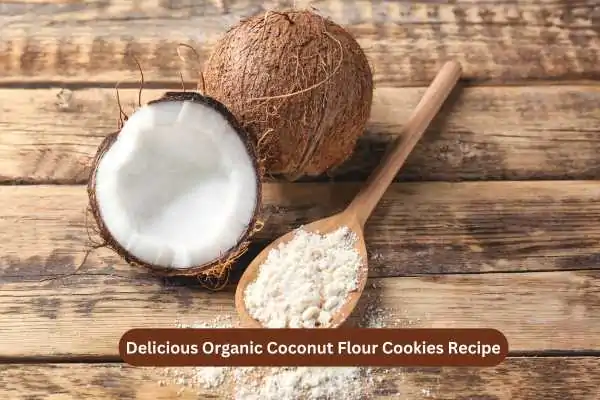When it comes to healthier baking, coconut flour has carved a niche for itself in many UK households. Known for its light texture and naturally sweet flavour, it’s a versatile ingredient that’s especially popular among those following gluten-free or grain-free diets. Organic coconut flour cookies are a fantastic way to enjoy a guilt-free treat that doesn’t compromise on taste or texture.

In this article, we’ll walk through everything you need to know about making delicious cookies with organic coconut flour. From the unique qualities of this ingredient to a step-by-step recipe and practical baking tips, you’ll be equipped to create soft, flavourful cookies that everyone can enjoy.
Why Choose Organic Coconut Flour?
Coconut flour is made from dried, ground coconut meat. When labelled organic, it means the coconuts have been grown without synthetic fertilisers, pesticides, or harmful chemicals, ensuring a more natural product. This not only benefits the environment but also offers peace of mind for families who prefer clean, wholesome ingredients.
Nutritionally, coconut flour is rich in:
-
Fibre – promoting better digestion and helping you feel full longer.
-
Healthy fats – including medium-chain triglycerides (MCTs) that provide quick, sustainable energy.
-
Plant-based protein – supporting muscle repair and growth.
-
Low carbohydrates – making it a suitable choice for those following a lower-carb lifestyle.
All of these qualities make organic coconut flour an excellent option for everyday baking in the UK.
The Unique Qualities of Coconut Flour
Before diving into the recipe, it’s important to understand that coconut flour behaves differently compared to traditional wheat or even other gluten-free flours. It is:
-
Highly absorbent – it soaks up a lot of liquid, so recipes require extra eggs or moisture.
-
Naturally sweet – reducing the need for large amounts of added sugar.
-
Delicate in texture – resulting in light, soft baked goods rather than dense ones.
Because of these qualities, coconut flour can’t be substituted 1:1 with wheat flour. Recipes need to be adjusted accordingly, which is why following a tested recipe is key to achieving the best results.
Organic Coconut Flour Cookies Recipe
Here’s a simple and reliable recipe for making organic coconut flour cookies at home. This batch yields around 12–14 cookies.
Ingredients:
-
½ cup organic coconut flour
-
¼ cup organic coconut oil (melted)
-
3 large free-range eggs
-
½ cup organic coconut sugar (or light brown sugar)
-
1 tsp vanilla extract
-
½ tsp baking soda
-
A pinch of sea salt
-
Optional: ½ cup dark chocolate chips or chopped nuts
Method:
-
Preheat the oven to 180°C (350°F) and line a baking tray with parchment paper.
-
Mix the wet ingredients. In a large bowl, whisk the eggs, melted coconut oil, coconut sugar, and vanilla extract until smooth and combined.
-
Add the dry ingredients. Sift in the coconut flour, baking soda, and sea salt. Stir until you form a soft dough. The mixture may seem thicker than traditional cookie dough—this is normal.
-
Shape the cookies. Scoop small spoonfuls of dough and roll them into balls. Place them on the baking tray and gently flatten with your fingers or the back of a spoon.
-
Bake. Place the tray in the preheated oven and bake for 10–12 minutes, or until the edges turn golden brown.
-
Cool and enjoy. Allow the cookies to cool on the tray for 5 minutes before transferring them to a wire rack. This helps them firm up while retaining a soft centre.
Flavour Variations
Organic coconut flour cookies can easily be customised. Here are a few ideas to keep things exciting:
-
Chocolate Chip: Add high-quality dark chocolate chips for a classic touch.
-
Nutty Delight: Stir in chopped almonds, pecans, or hazelnuts.
-
Spiced: Mix in a teaspoon of cinnamon or nutmeg for a warming flavour.
-
Coconut Boost: Sprinkle desiccated coconut on top before baking.
These variations make the cookies suitable for everything from school lunch boxes to elegant afternoon tea spreads.
Tips for Baking with Coconut Flour
-
Don’t skip the eggs. Eggs are crucial in coconut flour recipes as they add moisture and binding. For vegan alternatives, use flax or chia eggs, though the texture may differ slightly.
-
Measure carefully. Coconut flour is dense—just a little too much can make your cookies dry. Use level measurements for accuracy.
-
Check early. These cookies bake quickly, so keep an eye on them to prevent over-browning.
Storing Your Cookies
Once cooled, store your organic coconut flour cookies in an airtight container at room temperature for up to 4 days. For longer storage, place them in the refrigerator for up to a week, or freeze for up to three months. Simply reheat in a warm oven for a few minutes to enjoy them fresh again.
Why UK Bakers Love Them
Coconut flour cookies are a hit in UK kitchens because they strike a balance between indulgence and health. They’re free from gluten, naturally sweetened, and made with organic ingredients, appealing to families, health enthusiasts, and anyone looking to reduce processed foods. Paired with a cup of tea, they’re a comforting yet wholesome treat that fits seamlessly into everyday life.
Final Thoughts
Organic coconut flour cookies are proof that healthier baking doesn’t have to be bland or complicated. With a few pantry staples and a little time, you can create cookies that are soft, flavourful, and packed with natural goodness. Whether enjoyed as a snack, dessert, or even breakfast on busy mornings, these cookies are a satisfying choice for anyone in the UK looking to bake with both flavour and health in mind.

